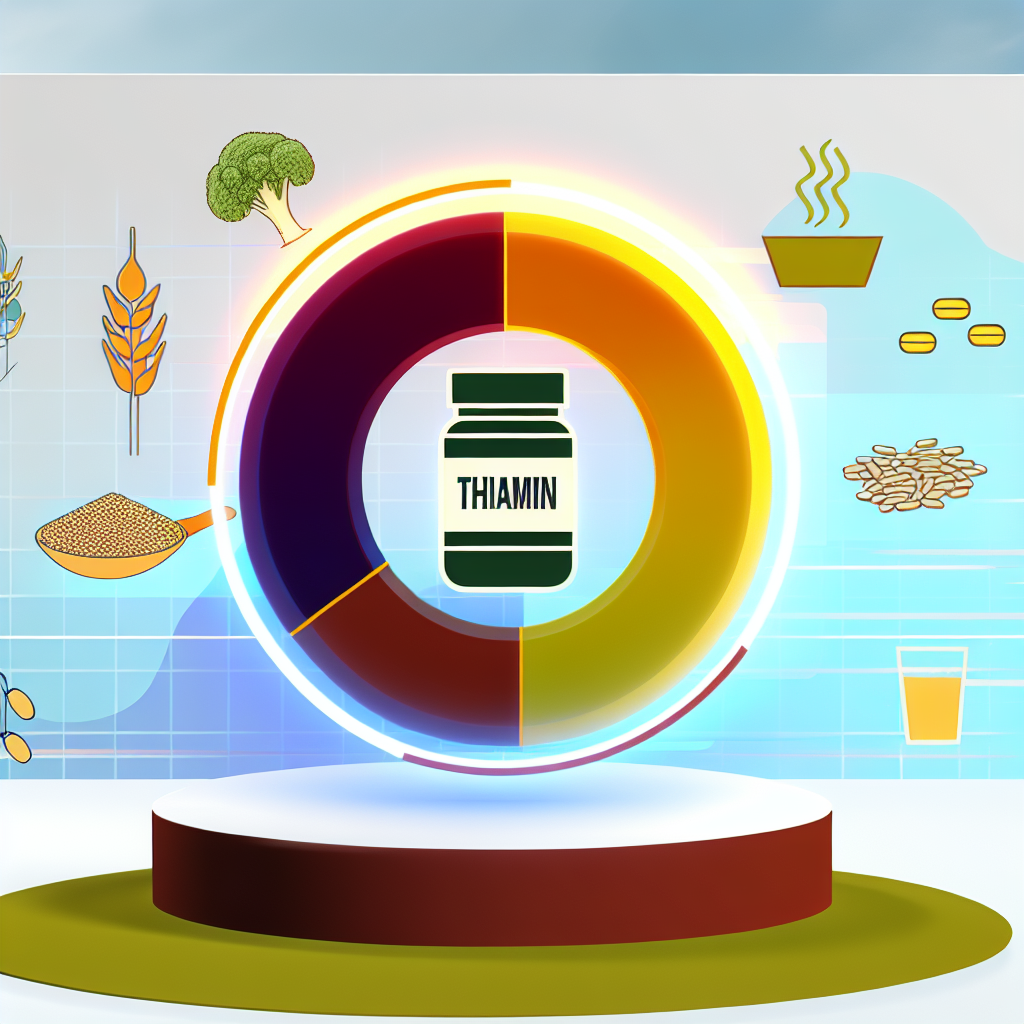Feeling constantly drained, mentally foggy, or experiencing muscle cramps can often point to a deficiency in thiamine, better known as Vitamin B1. This essential nutrient works behind the scenes to help your body convert food into energy, support your nervous system, and keep your heart healthy. Despite its importance, thiamine doesn’t always get the spotlight it deserves.
In this article, we’ll dive into the benefits of thiamine, explore easy ways to add it to your diet, identify symptoms of deficiency, and explain when supplements might be necessary. By the time you finish reading, you’ll understand why thiamine is key to your health—and how to make sure you’re getting enough of it.
What Is Thiamine (Vitamin B1)?
Thiamine is one of the eight B vitamins, essential for your body’s metabolism and energy production. It works by helping your cells convert carbohydrates—the bread, pasta, and fruits you eat—into usable energy. Think of thiamine as the ignition switch your metabolism needs to function properly.
But thiamine doesn’t just energize you; it’s also crucial for neurological health. It supports brain activity and ensures smooth nerve communication throughout your body. A deficiency can result in conditions like Beriberi (marked by weakness and heart problems) or Wernicke’s encephalopathy, a brain disorder often associated with excessive alcohol use.
The Top Health Benefits of Thiamine
Thiamine plays a wide range of roles in your body, so let’s break down its core benefits:
- Boosts Energy Levels: Thiamine converts carbohydrates into energy, fueling your cells to keep you active and alert throughout the day.
- Supports Brain Function: This vitamin facilitates neurotransmitter activity, improving concentration, memory, and cognitive sharpness.
- Promotes Heart Health: Thiamine is vital for maintaining the muscles of your heart, ensuring it beats steadily and efficiently.
- Maintains Nerve Function: Thiamine helps transmit nerve signals throughout your body, preventing discomfort like tingling and uncoordinated movements.
These benefits highlight why thiamine is so essential to your overall vitality—and why you need to make sure your intake is sufficient.
Signs and Symptoms of Thiamine Deficiency
Although thiamine deficiency is less common in developed countries, certain groups are at higher risk. Heavy drinkers, people with medical conditions like Crohn’s disease, and pregnant women often need extra attention to their thiamine levels.
Here are some common symptoms to watch for:
- Fatigue and lack of energy, even after resting
- Muscle weakness or cramps
- Mood swings or irritability
- Numbness or tingling in extremities
- Loss of appetite
- Difficulty concentrating or memory problems
Severe deficiencies can lead to conditions like Beriberi or Wernicke's encephalopathy, which require medical attention. Recognizing these signs early can help prevent further complications.
The Best Dietary Sources of Thiamine
Getting plenty of thiamine can be as simple as including the right foods in your meals. Here are some rich sources of Vitamin B1:
- Whole Grains: Brown rice, oatmeal, and whole wheat bread are excellent options.
- Legumes: Lentils, black beans, and chickpeas offer a powerful mix of thiamine and fiber.
- Nuts and Seeds: Sunflower seeds and flaxseeds are great choices for salads, smoothies, or snacks.
- Pork: Among animal-based foods, pork is one of the densest sources of thiamine.
- Fortified Foods: Many breakfast cereals and bread are enriched with thiamine for convenience.
A helpful tip: Combine thiamine-rich foods in your meals. For example, lentil soup with whole-grain bread or a pork stir-fry can help meet your daily needs effortlessly.
Do You Need Thiamine Supplements?
Most people can meet their thiamine requirements by eating a balanced diet, but supplementation may be necessary for certain groups:
- Those recovering from conditions like alcoholism or malnutrition
- Individuals with a diagnosed deficiency
- Pregnant or breastfeeding women, who have heightened nutritional needs
- People with chronic health conditions such as diabetes or gastrointestinal disorders
The recommended daily allowance (RDA) for thiamine is as follows:
- Men: 1.2 mg/day
- Women: 1.1 mg/day
- Pregnant/Breastfeeding Women: 1.4 mg/day
Thiamine is generally safe even at higher doses, but it’s best to consult a healthcare professional before starting a supplement regimen.
How Much Thiamine Do You Actually Need?
The daily thiamine requirements are manageable and easy to meet with a thoughtful diet. Here’s a quick breakdown:
- Children (1–3 years): 0.5 mg/day
- Teens (14–18 years): 1.0–1.2 mg/day
- Adults: 1.1–1.2 mg/day
A practical approach? Include thiamine-rich foods in every meal. For example, a bowl of fortified oatmeal for breakfast, lentil soup for lunch, and grilled pork for dinner can easily cover your daily needs.
Frequently Asked Questions
Can I get enough thiamine through diet alone? Yes, most people can meet their thiamine needs by eating a variety of whole grains, legumes, pork, and fortified foods.
What happens if I don’t consume enough thiamine? A prolonged deficiency can lead to fatigue, nerve problems, and severe conditions like Beriberi or Wernicke’s encephalopathy.
Is thiamine safe in high doses? Thiamine is water-soluble, meaning excess amounts are excreted through urine. However, you should still stick to recommended doses unless advised otherwise by a healthcare provider.
Conclusion
Thiamine might not always be top of mind, but it’s crucial for powering your energy, supporting your brain, and maintaining your heart and nerves. Eating a balanced diet with thiamine-rich foods is usually enough to keep your levels steady, but certain health situations may warrant supplementation.
Taking a closer look at your nutrition today can make a big difference in how you feel tomorrow. So whether it’s swapping white rice for brown or adding sunflower seeds to your snack routine, small changes can have a big impact on keeping this vital nutrient in check.
